Tomorrow, I have my fifth Humira injection. By the sixth shot I will have been on it for three months, which is when the cumulative effect should be evident. I’m going to be honest. That scares the crap out of me.
I am doing a lot better. I can walk without my cane. I can do small amounts of work. I can eat some things I couldn’t before without going to into total flare. My overall energy and mobility seems improved.
However, the pain is not. The pain is just as substantial and constant as it ever was.
What scares me? The injections scare me. I messed two of them up, which is a massive idiot move, because they are worth a ridiculous amount of money. So now when I do them, I am not only afraid of the pain, I am afraid of screwing up again. I was lucky enough to have the Humira nurse visit for my last injection, and she talked me through it again, plus gave me a practice pen. So tomorrow I should be ok.
What else scares me? I’m scared that the drug I have pinned all my hopes on isn’t going to work out. I’m scared that I’m stuck with this pain, that nothing is ever going to be able to change it. None of the pain medication I am prescribed really touches it. At the moment I am doing a program with a psychotherapist who specialises in pain management. She’s helping me learn to live with my condition.
What else? I’m scared to get well. It sounds ridiculous, I know. I *want* to get well, more than anything. And I am afraid of how I’m going to be able to cope. Especially if “well,” for me, means that the illness is in check – but I am still in pain. How will I work forty hours a week when sitting becomes indescribable? I know the answer, really. I will, because I’m a survivor, and because I want to, so I will learn new ways, and I will make it work. But that doesn’t mean it’s not daunting as hell.
I found this thing on Christie Leigh Stewart‘s tumblr last night. As my illness gets even more invisible, it felt pretty relevant.
It really made me laugh out loud, for several reasons.
1. Yeah, I’ve tried. I’ve tried a lot. I’ve tried everything. I’m trying RIGHT NOW even though you might not be able to tell. People so often make assumptions about other peoples’ experiences, and so often their ideas to help are… well, not so helpful.
2. The fact that it’s man telling a woman activated my feminist radar hard. Of coooourse, if she hasn’t tried it *his way* then she hasn’t really tried, has she? It’s very important that he explain to her how walking works.
3. His pose in the last frame is utter hilarity. I feel like I have literally had people do this to me. “You need to try again, Sarah… like this. Like *I* do it.”
I’m not trying to be bitter here. I am well aware people want to help, and I appreciate that, more than anything. It’s about how the help is offered.
I was speaking to another friend with a disability recently. The thing that this comic above illustrates so well is that often the advice actually misses the reality of the disability. Things like attitude and exercise and all of that will help, yes. But the *reality* is, I have Ankylosing Spondylitis. I can manage it all I want, and I will, I’ll give that my all, because I want to live as full a life as possible. But I’m the woman in the wheelchair. The wheelchair is there and it’s actually not going to go away. She can try all she likes. I can and will try all I like. My arthritis is not going away.
A lot of advice asks me to ignore or push through or fight my illness. It asks me to not accept. It demands that I ignore my reality.
The thing that is different in the mindfulness training I am doing with the pain psychotherapist, is ACCEPTANCE.
My mindfulness asks me to *see* the pain and sit with it. I do a “body scan” practice every day for thirty minutes. Even though it can often be extremely painful, the point is to try not to move during the practice. I listen to a therapist, who talks me through examining each section of my body, bit by bit. I do not try to change or run away from anything. The aim is to become “equanimous.” To feel the pain, and not react to it. I’ve been doing it for four weeks. It’s working.
The more I accept that this is my life, and the less I yell things in my head like “This is not fair,” and “Oh my god it fucking hurts so much I can’t take it anymore” and the more I change that to the dispassionate: “I have arthritis” and “I notice my back is tight. I notice my knuckles are swollen” the better things get. The most powerful thing I’ve done so far is try to stop calling it “my pain,” at least in my head for a start.
The phrase “my pain” is very evocative and very proprietary. It brings up all the history. It’s a negative, horrible, bad thing – and it’s mine. What did I say at the start of this post? “I am afraid of the pain.” I really don’t want to keep reinforcing that. I don’t want to own it.
Instead I try to name the actual sensation in a dispassionate way. I am not saying this is easy. It’s ridiculously hard, so, so hard. And not reacting to the sensation? Near impossible. But I think it’s the key that I’ve been missing. Where I say earlier in this post “what if I have this pain forever? How will I live it?” – this is how. Acceptance.
If you have a pain clinic in your town, you can often get a referral through your GP, and they may have this sort of therapist on board. This guy designed the program my therapist works with.
Really: the main thing is, different things work for different people. I write about what does and does not work for me so that maybe others can try it if they want to. And only if they want to. Because illness is person. You never have to “try” someone else’s way.

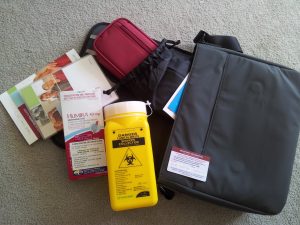
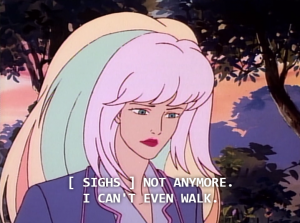
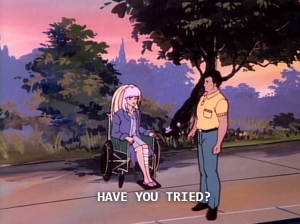
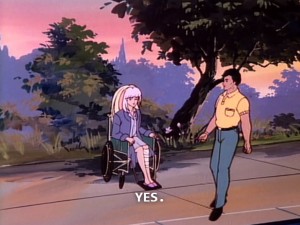
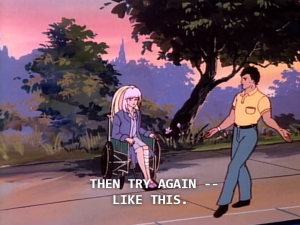
It has never helped with the pain for me, just slows the progression of the disease for some, they told me, doesn’t stop pain per se, some people have said they have less pain but most say no difference in pain levels. it is very interesting this whole pain thing.:) anyways see you friday for chats and laughs.
Yeah I don’t think it makes the pain go away, but it reduces the perception of it. It changes the neural pathways we reinforce by constantly focusing on the pain. Like I said, way easier said than done, and it definitely won’t work for everyone. If it helps me even a little, I’m willing. See you at the pool Friday!
Thanks Sarah. This really reflects a lot of what my partner is going through. Long term pain, with no real expectation of it ever going away. In her case the cause is still undiagnosed and shows every sign of continuing to be.
Despite going through a chronic pain course and being introduced to mindfulness, one of the things she struggles with is finding a way to stop fighting. To stop resisting the pain and its effects on her.
Acceptance sounds so good, but starting on the road towards it can feel like jumping into the dark. Or perhaps climbing over an electric fence to get to the greener grass.
I absolutely resist. Like I said it’s super fricken difficult – it goes against all our survival instincts to just go “Ok, I am noticing this sensation, but I am not going to do anything to suppress or escape it.”
Getting my diagnosis of AS was massive for me in terms of reaching acceptance. I really feel for your partner, not having a label or a reason makes pain especially difficult. Now that I know what the shape of my illness, the probable shape of my life, I can accept that things have changed drastically.
I’m here for both of you if you have questions or anything else I can be of assistance with.
Your writing is beautiful, and reminds us of the importance of respecting and resourcing the personal health sovereignty of others when we try to help them.
Mindfulness has been a lifesaver for me (learned it at a local hospital in Canada). Helped me separate pain from suffering. I think it is useful both individually and relationally, but everyone’s mileage varies.
Best wishes.